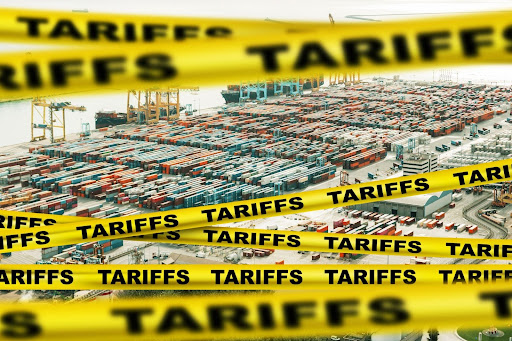A tariff is a tax imposed on foreign-made goods, paid by the importing business to its home country’s government. The most common kind of tariffs are ad valorem, which are levied as a fixed percentage of the value of the imports. There are also “specific tariffs,” which are charged as a fixed amount on each imported good and “tariff-rate quotas,” which are tariffs that activate and/or rise significantly after a certain amount of imports is reached. Tariffs are often enacted to protect domestic manufacturing, farming and technology industries.
Tariffs are creating both challenges and opportunities for North American businesses. The obvious challenge is increased cost of goods for any components that are imported. On the logistics side, reduced imports and exports will likely mean a reduction in loads. All of these issues can put a strain on a business’s cash flow. A quick solution to business cash flow problems is invoice factoring.
Invoice factoring is the purchase of accounts receivable for immediate cash. Invoice factoring gives businesses the power to ensure growth without diluting equity or incurring debt. After invoices are submitted and verified, they are typically funded within 24 hours. Whether a business is in a growth phase or a low period, working capital is crucial to keep things going. It’s tough to cover expenses when you’re waiting on your customers to pay for 30, 60 or 90 days. Factoring allows you to get paid right away. Once the factoring company buys your invoices, they become your accounts receivable department.
The Direct Impact: Increased Financial Pressures and Need for Factoring
Many industries stand to be affected by tariffs. Some of the most notable industries are auto, agriculture, manufacturing and construction.
Protective tariffs on steel and aluminum imports, for instance, would affect industries such as automotive and construction, which use these materials extensively. Whether US manufacturers continue to buy from abroad, swallowing the tariffs, or switch to US suppliers, input costs will increase. Although increased cost may be able to be passed on to customers, businesses will likely still feel a cash squeeze when they have to pay suppliers before they can collect payment from customers.
Supply Chain Disruptions and Payment Delays
Tariffs can disrupt supply chains by upsetting the trade balance between countries thus creating delays in transoceanic shipping and air freight throughout the world and North America. In a clear sign that tariffs are beginning to impact global trade, ocean container bookings from China to the United States have dropped sharply in recent weeks. Data from SONAR’s Container Atlas reveals that daily bookings on this crucial trade route have plummeted 25% compared to the same period last year, signaling a potential seismic shift in trans-Pacific trade patterns. This can cause delays in fulfilling orders, delivering orders on time, meeting PO and contract commitments and deadlines which further delay payment.
Increased Need for Working Capital
Supply chain delays create a greater need for working capital, to both offset higher costs and provide operating income to manage the delayed payment cycle.
Case Study/Example
A furniture manufacturer in the US imports wood from Canada. A new 15% tariff on Canadian lumber increases their raw material costs significantly. They sell their invoices worth $50,000 to a factoring company and receive $40,000 immediately. This cash allows them to pay their suppliers despite the higher lumber prices and continue production without disruption.
Improved Working Capital
By converting accounts receivable into immediate cash, invoice factoring enhances the business’s working capital. This improved liquidity provides financial flexibility to navigate the challenges posed by tariffs, such as adjusting pricing strategies, exploring alternative (potentially more expensive) domestic suppliers, or even investing in strategies to mitigate tariff impacts in the long run.
Mitigating Risk by Factoring
Elevated Credit Risk
Tariffs can negatively impact the financial health of businesses (clients and their customers), leading to a higher risk of delayed or non-payments on invoices. Partnering with a reputable non-recourse factoring company can help companies significantly mitigate risk.
Sector-Specific Vulnerabilities
Manufacturing companies that rely on import parts and sub-assemblies are at particular risk for price increases and supply chain disruptions. Additionally, distribution companies that import finished goods manufactured overseas and distributed/sold domestically are equally at risk. Experienced non-recourse factoring companies are well-versed in evaluating and monitoring the credit health of companies in these industries.
Cross-Border Collection Challenges
Choosing a factoring company with offices in the U.S. and Canada helps address the complexities of cross-border transactions and lends an added level of security in financially unstable times. Additionally, partnering with a factoring company that has experience with cross-border traffic between the U.S. and Mexico affords an additional layer of protection along the Southern Border.
Invoice Factoring in the Tariff Environment
- Providing Financial Lifelines: Factoring is a crucial tool for businesses to navigate the financial uncertainties caused by tariffs and maintain operational stability.
- Supporting Supply Chain Adjustments: Factoring can help businesses manage cash flow during periods of supply chain restructuring or diversification in response to tariffs.
- Specialized Factoring Solutions: Factoring companies with both U.S and Canadian offices (like Riviera Finance) offer unique perspective and expertise when dealing with trade issues between the two countries.
- Focus on Domestic Trade: Tariffs on imports from outside North America could boost domestic trade within the region, creating opportunities for businesses focused on internal North American commerce.
- Enhanced Due Diligence: Factoring companies conduct more thorough credit assessments of their clients’ customers, considering the potential impact of tariffs.
- Flexible Factoring Agreements: Factoring offers flexible terms and solutions that can adapt to the evolving needs of businesses in the face of tariff-related uncertainties.
- Strong Communication and Client Support: Decentralized factoring companies (like Riviera Finance) offer regional, proactive communication with their clients. Factoring companies understand their client’s challenges and are there to help.
- The Resilience of Factoring: Despite the challenges, invoice factoring will likely remain a vital financial tool for North American businesses despite the complexities of navigating a tariff-impacted market.
Why Choose Riviera Finance?
With decades of experience and a reputation for excellence, Riviera Finance is one of the most trusted names in the invoice factoring industry. Here’s why small businesses choose Riviera Finance:
- Trusted Industry Leader – With over 50 years of experience, Riviera Finance has built a strong reputation for helping businesses overcome cash flow challenges.
- Non-Recourse Factoring – Unlike many factoring companies, Riviera Finance offers true non-recourse factoring, meaning they absorb the credit risk of non-payment, giving businesses peace of mind.
- Fast Approvals & Funding – Businesses can receive cash in as little as 24 hours after invoice submission, providing a quick and reliable financial solution.
- Exceptional Customer Service – Riviera Finance provides dedicated account managers who offer personalized service and expert financial guidance.
- Nationwide Coverage – With offices across the United States & Canada, Riviera Finance supports businesses of all sizes and industries, no matter their location.
Steps to Get Started with Riviera Finance
Getting started with Riviera Finance is a straightforward process designed to provide businesses with fast and hassle-free funding.
- Submit an Application – The first step is to fill out a simple application with basic business and financial information.
- Invoice Verification – Riviera Finance verifies the invoices to ensure they are legitimate and qualify for factoring.
- Receive Funding – Once approved, businesses receive up to 90% of the invoice value within 24 hours.
- Riviera Finance Collects Payment – Customers pay directly to Riviera Finance, and once the invoice is settled, the remaining balance (minus the factoring fee) is released to the business.
If you’re looking for fast, easy cash flow access, contact us online and get funding in as little as 24 hours.




